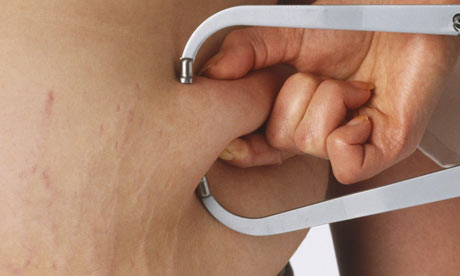
The NHS has seen a ninefold rise in five years in the number of surgical procedures performed on obese patients to try to reduce their weight.
The figures illustrate the challenge the government faces in trying to tackle the problem of obesity. In 2008-09, the NHS carried out 4,246 weight loss operations, including stomach stapling and fitting gastric bands, compared with 480 procedures in 2003-04, according to the NHS Information Centre.
Of the operations performed in 2008-09, 42 involved full or partial removal of the stomach; 1,378 involved fitting a gastric band to make the stomach smaller; 504 involved stomach stapling; 2,210 involved a gastric bypass; and 124 inserting a "bubble" in the stomach to fill it up. Patients may have undergone more than one procedure in the same operation. The upward trend in the data suggests the figures for 2010 could be higher.
The surgery is only recommended for people with a body mass index of at least 40, or 35 if they suffer from another condition that the surgery could improve, such as diabetes. Patients must also have failed to lose weight through other methods first, such as by dieting.
Tam Fry, from the National Obesity Forum, said: "These figures just show how bad things have got with the obesity epidemic." He also suggested that the availability of the surgery was providing a perverse incentive for obese people to gain weight in order to qualify for it.
"There is a premise that if you feed yourself up, you get to the bar – 35 BMI with comorbidities or 40 without – then the operation would be yours," he said.
"A lot of doctors are also starting to skirt around the rules and not insist on months of lifestyle change and pharmaceutical treatment – instead they are going straight for surgery.
"There's something in the order of 500,000 people who might be eligible for surgery."
Peter Sedman, a spokesman for the Royal College of Surgeons, said: "There are a significant number of people for whom surgery is the only remaining option as all other methods of treatment have failed."The figures correspond with another study published online in the British Medical Journal (BMJ), which found there has been an "exponential" 10-fold rise in weight loss surgery between 2000 and 2007. Experts from Imperial College, London, found 6,953 procedures had been carried out – rising from 238 operations in 2000 to 2,543 in 2007.
According to figures from the Office for National Statistics the proportion of the adult population in England classed as obese rose from 15.7% in 1994 to 24.5% in 2008. In Scotland, the figure was 26.8% and in Wales it was 21%.
There are more than 1 billion overweight adults worldwide, at least 300 million of them obese, according to the World Health Organisation. The South Pacific island of Nauru has the highest proportion – more than three-quarters of the adult population. The UK has regularly featured in the WHO's top 10 most obese nations in recent years, although the US has significantly more obese adults, with about a third classified as such.

